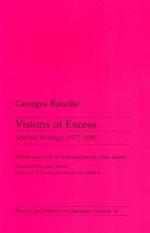
|
| Name: _________________________ | Period: ___________________ |
This test consists of 15 multiple choice questions and 5 short answer questions.
Multiple Choice Questions
1. What was the essay "Sacrifices" used as?
(a) As a preface.
(b) A criticism.
(c) A review.
(d) A personal essay.
2. What does Bataille say the world offers modern man to love?
(a) Nothing beyond self-interest.
(b) God and religion.
(c) A society to be assumed.
(d) The progress of capitalism to communism.
3. Which of the following does Bataille NOT use as an example of unproductive expenditure without value beyond itself?
(a) Luxuries.
(b) Art.
(c) War.
(d) Public gardens.
4. What does Bataille say is the only religion for fascists?
(a) Christianity.
(b) Race.
(c) Technology.
(d) Power.
5. What did professor Hartmann dispute about the treatment of the Marx/Hegel dialectic?
(a) He objects that it is only applicable in certain cases.
(b) He objects that it is not grounded in political science.
(c) He objects that it is based on pseudo-science.
(d) He objects that it is not a law of reality.
6. How did Engels and Hartmann differ on the tenets of Hegel's "Philosophy of Nature"?
(a) Engels believed them, but Hartmann was indifferent.
(b) Engels was indifferent to them, but Hartmann did not believe them.
(c) Engels did not believe them, but Hartmann did.
(d) Engels believed them, but Hartmann did not.
7. With whose picture does Bataille say Nietzsche's picture was paired?
(a) Lou Andreas-Salomé's.
(b) Hitler's.
(c) Darwin's.
(d) Hegel's.
8. When does an obelisk cease to be meaningful?
(a) When the people have more important needs.
(b) As soon as the authority it symbolizes becomes conscious.
(c) When the military leader who erected it dies.
(d) When the political party that built it is voted out.
9. What was Nietzsche's life dominated by, in Bataille's account?
(a) Stifled affection for a woman.
(b) Obsession with a lost world.
(c) Puzzles in which he could see the nature of society.
(d) Aggression toward the social world.
10. What kinds of expenditure does artistic production require?
(a) Real or symbolic expenditure.
(b) Public or patron expenditure.
(c) Religious or secular expenditure.
(d) Patron or market expenditure.
11. What is classical utility theory inadequate to define, in Bataille's opinion?
(a) What is aesthetically valuable.
(b) The value of tranquility.
(c) What is useful to man.
(d) The value of religious belief.
12. What does Bataille define as a way to humiliate, defy, or obligate a poorer person as a show of destruction of wealth?
(a) Potlatch.
(b) Public Assistance.
(c) Welfare.
(d) Government subsidies.
13. What does Bataille say scientists said about the dialectic?
(a) It was incompatible with science.
(b) It was the one true science.
(c) It was a matter of faith.
(d) It was demonstrated in evolution.
14. Under whom does fascism unite society, in Bataille's account?
(a) A leader who identifies with the state.
(b) A leader who represents the lower common denominator of society.
(c) A leader who identifies with the individual everyman.
(d) A leader who represents the aristocratic self.
15. What are the two forms of heterogeneity Bataille introduces in "Psychological Structure of Fascism"?
(a) The Marxist revolution and the capitalist marketplace.
(b) The bourgeois merchant and the Jewish banker.
(c) The sovereign and the worker.
(d) The policeman and the drunkard.
Short Answer Questions
1. Whom does Bataille say can never touch the reality of earth?
2. How do men express their 'being', in "The Labyrinth"?
3. Who is the audience for "The Practice of Joy before Death"?
4. What does Bataille describe in "The Critique of the Foundations of the Hegelian Dialectic"?
5. What is the significance of the obelisk in "The Obelisk"?
|
This section contains 619 words (approx. 3 pages at 300 words per page) |

|




